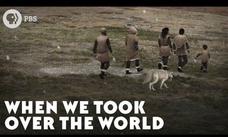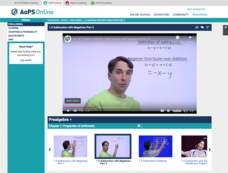PBS
When We Took over the World
Exactly how did humans become the top of the food chain? Follow archeologists through an analysis of the fossil records during a video presentation from the PBS Eons series. The ancient artifacts trace human evolution from Africa to the...
PBS
The Mystery behind the Biggest Bears of All Time
Bears come in many different shapes and sizes. Follow the evolution of the prehistoric bear through time in an episode from the PBS Eon series. The narrator discusses the evolution of the bear by examining adaptations and their...
GCFGlobal.org
Word: Text Boxes
How do users add text to a specific location on a Word document? Enter text boxes! By watching a helpful video, viewers discover how to create, move, and resize text boxes. Additionally, they learn how to change the shape of text boxes...
GCFGlobal.org
Word: Check Spelling and Grammar
What's the best way to proofread a Microsoft Word document? Viewers of a helpful video learn how to create polished prose by running a spelling and grammar check. They also discover how to ignore some of Word's incorrect suggestions and...
GCFGlobal.org
Word: Aligning, Ordering, and Grouping Objects
How does arranging objects enhance the overall look and feel of a Microsoft Word document? Using an informative resource, scholars discover how to align, order, and group objects. They also learn how to distribute pictures, text boxes,...
GCFGlobal.org
Word: Formatting Pictures
Image is everything. Using the resource, viewers learn the basics of formatting pictures in Microsoft Word and Office 365. They discover how to crop images, add borders, and make adjustments to enhance a document's appearance.
Mathispower4u
Direct Variation Applications
What would I weigh there? A video uses the relationship of the weight of an astronaut on Earth and the moon to create a direction variation equation. Using the created equation, pupils find the weight of any astronaut on the moon.
GCFGlobal.org
Word: Tables
Pull up a chair ... it's time to learn about tables. Using an informational resource, scholars learn the basics of working with tables in Microsoft Word. They discover how to insert a blank table, modify tables, and convert existing text...
GCFGlobal.org
Word: Shapes
Circles and squares and rectangles, oh my! Using the resource, viewers learn about adding shapes to a Microsoft Word document to make it more visually appealing. Scholars also discover how to resize shapes and add special effects.
Bite Sci-zed
Theory vs. Scientific Theory
Why do people have scientific theories but not scientific facts? A quick video presentation defines scientific theory and the components necessary for developing a theory. The presenter emphasizes the difference between scientific proof...
Corbett Maths
Fractions to Decimals
Apply one definition of fractions to convert them to decimals. Pupils use the definition of fractions as division problems to convert a fraction to a decimal. Learners then practice their long division skills on two worksheets to convert...
Corbett Maths
Percentages: Multipliers for Increasing and Decreasing by a Percentage
Solve two-step percent problems with a single multiplication. By reviewing how to find the percent of a problem, the video introduces the idea of finding multipliers to find solutions for increasing or decreasing percent problems. Pupil...
Corbett Maths
Percentages: Increasing or Decreasing by a Percentage
Increase or decrease the value. Individuals learn how to determine a new value after being either increased or decreased by a percent. Pupils then practice their skills using a worksheet that covers the concepts.
Corbett Maths
Percentages: Change
How much did it change? The presenter works two problems to demonstrate how to calculate percentage loss and increase. Pupils have one learning exercise to practice similar problems on their own.
Corbett Maths
Recipes
Just how much of each ingredient is required? The resource works a few examples of scaling a recipe to feed more or fewer people than outlined. Pupils follow the examples to work out similar problems.
Bite Sci-zed
DNA Extraction!
Extracting DNA is probably easier than pupils think! A quick video demonstrates one method of extracting an individual's DNA. The presentation shows each step of the process as well as the results.
Bite Sci-zed
Why Red Blood Cells Look Like Donuts
There are specific reasons for the intricate anatomy of the body, and the shape of the red blood cells is no exception! A video presentation explains the role of red blood cells and why their shape is important to function. The...
Art of Problem Solving
Subtraction and the Distributive Property
There's got to be a better way. Scholars learn that the distributive property does work with subtraction and not just addition. Using that fact, the video shows how to find the product of two numbers by rewriting a complicated number as...
GCFGlobal.org
Word: Using Find and Replace
What's the fastest way to find and replace text in a lengthy Word document? The eighth installment from the 44-part Microsoft Word series shows viewers how to use the find command to search for a specific word or phrase in a document....
Art of Problem Solving
Subtraction Problems
Subtraction does not work with the commutative property ... or does it? Confronted with a difficult problem, the narrator realizes that by writing the subtractions as adding a negative, he can rearrange the problem. Pupils learn that as...
Art of Problem Solving
What's a Reciprocal?
If there is something in addition to get to the identity, does the same exist for multiplication? Using negative numbers to talk about the identity of addition, the video asks the question whether something similar exists for...
Art of Problem Solving
Subtraction with Negatives Part 2
Dive deeper into subtraction. The presenter shows two more ways to use the definition of subtraction to solve subtraction problems. Using the distributive and commutative properties, pupils learn how to solve problems such as subtracting...
Art of Problem Solving
Subtraction with Negatives Part 1
What is the definition of subtraction when dealing with negatives? The short video provides the definition of subtraction. Scholars observe as the presenter applies the definition to examples with negative numbers.
Math Antics
Convert Any Fraction to a Decimal
Find another way to write a fraction. Using long division, the video shows how to convert a fraction into a decimal. Learners use their knowledge of fractions to then set up the division problem.























